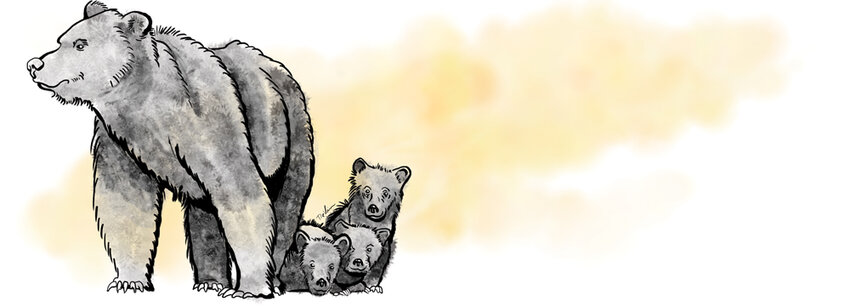 Illustration by Doug De Visser.
Illustration by Doug De Visser.By Maya Hunger
Fresh salmon carcasses and bear scat lined the shore of an icy stream next to a narrow trail. A group of 22 hikers led by UnCruise Adventures guiding service walked the Alaskan trail, winding between trees and over roots, skirting brush and dense forest. As is typical guiding practice, one guide, Michael Justa, took sweep and his more experienced co-guide, Marika,* took the lead
position.
The group left the UnCruise ship in the morning via skiff and planned to hike 4.4 miles to Sitkoh Lake and return to the ship in time for dinner. The group was the biggest (and therefore slowest) that UnCruise had led in the 2016 season and as lunchtime approached, it became apparent to the guides that they would have to rush to make it back to the skiffs in time for their scheduled pick-up.
The group made frequent “Hey bear, woah, bear” calls, but Justa suspects the stream made too much ambient noise for a mother and cub to hear their approach. Neither of the guides had seen a bear yet that season. Now, it was August 18 and while the focus on safety remained, the perception of danger had diminished and the group was rushing around blind corners.
“I heard a roar and initially thought it was a chainsaw. Eventually, it registered that it was a bear,” Michael said. “Then everyone started moving back and someone told me the bear had Marika.”
Michael pulled his bear spray off his belt and walked forward. Reaching the front of the group he was met with the sight of a full-size female grizzly and Marika on the ground. The bear charged Michael.
“I sprayed and sprayed and sprayed until the bear knocked me over and the bear spray fell out of my hand,” Michael said. “I didn’t really know what to expect at that point, the bear wasn’t stopping. But I guess the spray worked because after biting me, the bear left rather than tearing me apart.”
Michael assessed himself quickly and then turned his attention to Marika. He immediately pulled out his first aid kit – which, up to this point in the season had only been used as a glorified carrier for moleskin and band-aids – and dumped its contents onto the ground to sort through. He was using his Wilderness First Responder training for the first time, his Coban wrap had gone bad, his resources were limited and Marika was in critical condition.
Fortunately, he was able to call back to the first mate on the UnCruise ship to let the Coast Guard know they needed an evacuation. With the help of a nurse and doctor who happened to be in the group, Michael tended to Marika’s injuries and eventually Marika was flown to Seattle.
I spoke with Michael a month later while he was in the San Juan Islands with his wife. I had been following his story because as a guide myself, I wanted to know how he was mentally recovering. The media often focuses only on the blood, guts and physical recovery, leaving out the emotional trauma and the chance to educate the general public about how to prevent similar incidents.
This is a sentiment Michael shares following the attack.
Getting out of your comfort zone is my definition of taking risk, but there’s a right and a wrong way to do it
“The facts are important, the people are important, there’s more to the event than just blood and guts,” Michael said. “Being in the outdoors has definite risks involved; risk saturates the outdoor lifestyle, but I think that’s why people like it. Getting out of your comfort zone is my definition of taking risk, but there’s a right and a wrong way to do it.”
Michael believes this incident could’ve happened to anyone, and he said he has heard from quite a few other people who’ve ended up in similar situations in southeast Alaska.
“I think the cub was just doing cub things and the mom was trying to wrangle him in but he wasn’t listening, that’s my personal theory,” Michael said. “I would still hike in this area again, even at that time of year, but I would do some things differently.”
I had been impressed by Michael’s ability to return to guiding just two weeks after the incident without requesting additional mental health time. Yet as I talked to him, I realized he simply sees this incident as something that is apt to happen in southeast Alaska given a certain set of conditions.
Michael has not internalized the danger he found himself in, he never hinted at any kind of victimization for himself, and he doesn’t feel he should be painted as a hero for standing up to the mother grizzly attacking his coworker. His reflections on the incident center around what he could do differently in the future and how to equip a first aid kit for dealing with trauma and not just cuts and scrapes. He’s now obsessive about his first aid kit, he said.
“I am much more cautious about the human factor,” Michael said. “If we hadn’t hyped up the lake itself we wouldn’t have been rushing so much and we could’ve looked around the corners of the trail better. It’s a good reminder to set reasonable expectations for managing big groups in the backcountry.”
“Do you wish you had been carrying a gun?” I asked Michael. “No,” he responded quickly. “I don’t think a gun would’ve changed the situation. From what I hear, it takes a few rounds to take down a bear, and I only had a few seconds. Also, then you’ve got a dead or injured bear and if it’s a mom, now you’ve got orphaned cubs.”
As of October, Michael is in full physical health despite the menacing bite-mark scar around one of his knees. Information about Marika’s physical and mental condition has not been released. Her attack was much more vicious and destructive and I am told that her road to recovery is likely to be longer than Michael’s. x
*Though Marika’s full name has been published elsewhere, she has not yet talked to the press following this event and it’s our understanding that she would like to remain anonymous during her recovery. With that in mind we have opted to only include her middle name, which she commonly goes by.
 Maya Hunger is a Washingtonian who likes type 2 fun and human powered sports. Writing for various publications makes her feel like she is contributing to society while she spends the majority of her time far in the backcountry.
Maya Hunger is a Washingtonian who likes type 2 fun and human powered sports. Writing for various publications makes her feel like she is contributing to society while she spends the majority of her time far in the backcountry.